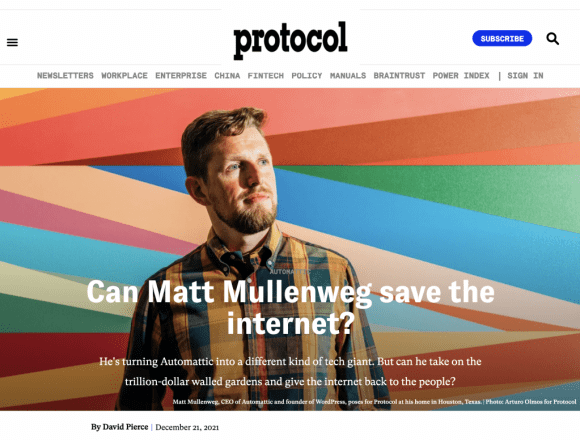David Pierce wrote a deep profile, over 4,000 words, for Protocol and asks the question in the headline, Can Matt Mullenweg save the internet?

Which brings to mind Betteridge’s law of headlines (née Hinchliffe’s rule), “Any headline that ends in a question mark can be answered by the word no.”
I can’t save the internet. But you know who can? A movement. A community of like-minded individuals, unified by a common philosophy, and working together to create tools of freedom.
It’s a human right to be able to see how that technology works and modify it. It’s as key to freedom as freedom of speech or freedom of religion. So that is what I plan to spend the rest of my life fighting for.
Working together we’ve created something special, unlike anything the internet has seen before, and I’m excited to continue.
Thank you to David Pierce for taking such an in-depth look at the history of WordPress and Automattic and talking to dozens of sources. Thank you to the people quoted in the article: Scott Beale, Om Malik, Toni Schneider, Russell Ivanovic, Deven Parekh, Paul Mayne, and Anil Dash. Thank you to Arturo Olmos for the photos, and Odili Donald Odita for the amazing painting behind me.
7 replies on “Saving the Internet”
The Daily Tech News Show podcast covered this article as one of its discussion topics on December 21.
https://dailytechnewsshow.com/2021/12/21/automattic-for-the-people-dtns-4176/.
The segment begins on the MP3 at 25:39 and on YouTube at 24:41 (https://youtu.be/_dX9NYwo0yM?t=1481).
Matt… first of all, you know I think what you do is awesome and you should 100% keep fighting for internet transparency and freedom.
Stoked that you have an RV! I just got a VW camper van this summer which I am going to use to write my book on financial independence for women (and why it is so important). I’ve called the van, Berry, as it is is a very special Berry colour that that don’t do anymore. What kind of RV did you get?
Merry Christmas! You still owe me an interview 😉 Maybe we can do it RV to VW.
This reminds me of a conversation I had with you a very long time ago. It was back when BuddyPress was first acquired and I asked what direction you intended to take it in, and you responded with the question of “where do you think I should take it?”. My response was that I felt it should allow people to hook into a decentralised social media platform to compete with Facebook. At the time I had a deep distrust in Facebook, although I admit that I eventually gave in once I realised that every person and their dog (literally) were on Facebook.
In retrospect, I think the focus needed to be on building an API which allowed individual websites to communicated with one another. They could then use this to create their own decentralised social media “platform”. BuddyPress at a later date, could then hook into that. I still think this is viable, but it would require a lot of careful thought in order to implement in a useful way.
Love this article so very much! Thank you for all you do, think and are doing. I’m deeply curious about how Automattic is building it’s culture of learning and social innovation across its portfolio and also integrated deeply within each vertical, especially as it pertains to the notion and evolution of Web 3? I’m deep in discovery learning about Web 3, am seeing similar culture trends that we experienced in Web 2 and Web 1 — a focus on building tech and not people and teams, developing and enclosing networks and not co-creating cultures that are open and inclusive, and importantly bias in who is building and permitted in! I would love your thoughts on how we can overcome these cultural issues that plague our drive for freedom and address them.
“The purpose of a writer [blogger] is to keep civilization from destroying itself.”
― Albert Camus
Congrats on this grand slam on CNBC!:
https://www.cnbc.com/video/2021/12/28/wordpress-founder-matt-mullenweg-lays-out-debate-over-future-of-the-internet.html
Since you mentioned “dozens of takes” for your State of the Word address… Listen to this Coltrane take at .35 speed and enjoy. Just grab an open source tenor and go. 🙂
Happy New Year!
https://youtu.be/0QaB670FzFk
This article reminded me why I love WordPress and Automattic. Particularly struck by this quote: “The only way to deal with an unfree world is to become so absolutely free that your very existence is an act of rebellion.”
Amen. How do I sign up to the rebellion?
The problem is that whilst all your points are true. WordPress (org and com) are not doing enough to actively make the web freer
The focus atm seems to be on Gutenberg, which is a useful tool but not transformational.
WordPress could/should spend on making core, WordPress.com, the default theses, and featured plugins compatible with the indie web movement and the fediverse.
It could also build out the the missing api like an object relationship api, comment type api, and post status api which would truly allow WordPress to be the operating system for the web.
A little work in the space would go a long way